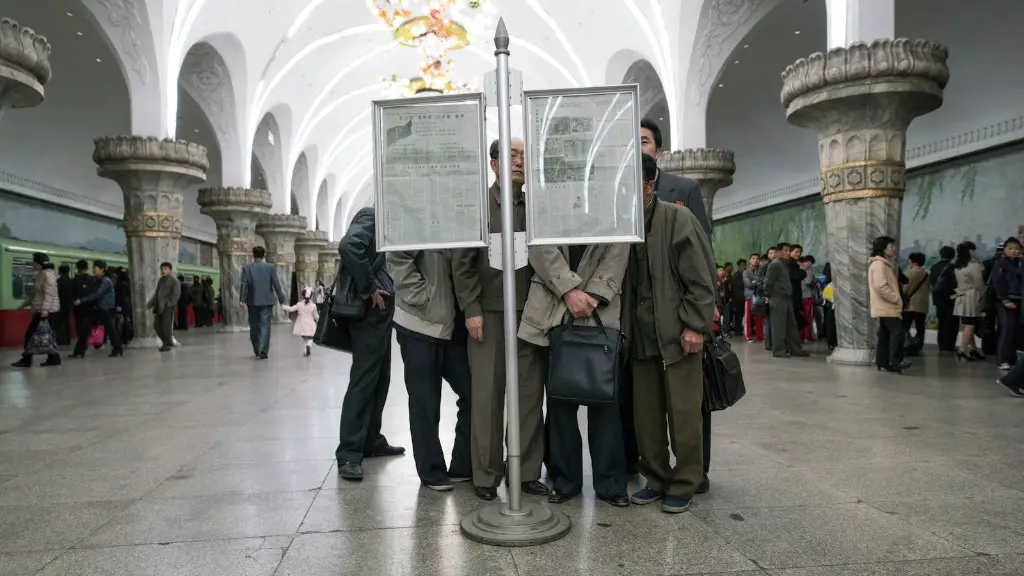North Korea has been shrouded in darkness in recent decades and hardly visible to the world. Although dictatorship plays a major role in North Korea’s darkness, another reason why North Korea goes dark at night is the country’s electricity shortages. Despite North Korean authorities making efforts in recent years to provide electricity to households, the country’s electricity resources have struggled to keep up with rising demand, resulting in sharp drops in power for homes and businesses.
The shortages are due to several reasons, one of which is the country’s lack of reliable access to energy sources. North Korea mostly depends on coal for its energy needs but due to its limited coal reserves, it struggles to turn these reserves into viable energy sources. Furthermore, the country’s declining economic output has made it even more difficult for North Korea to invest in energy projects.
Another reason for the electricity shortages is the country’s failure to upgrade its electrical infrastructure, mostly due to the lack of investment and modern technology. North Korea’s power lines and other infrastructure are extremely old and inefficient, and the country lacks the technology and resources to adequately repair and upgrade them.
Furthermore, North Korea’s complex bureaucracy and state control have prevented citizens from taking advantage of new energy sources. North Korea’s power grids are mostly state-controlled, limiting the ability of citizens and businesses to get access to reliable and affordable electricity.
Finally, the US-led sanctions imposed on North Korea have also played a role in the country’s electricity problems. The sanctions have limited North Korea’s access to international markets, making it difficult and expensive for the country to import energy resources and funds needed to upgrade its infrastructure.
Efforts to Improve the Situation
Despite the various challenges, North Korea has made efforts to improve its electricity situation. For example, the country has been investing in renewable energy sources such as solar and wind energy, which are emerging as viable alternatives to traditional energy sources. In addition, the country has also been ramping up its efforts in deregulating its energy sector, allowing more private companies to participate in the energy market and offering incentives for energy efficiency initiatives.
Furthermore, international organizations have been playing an important role in helping North Korea, especially with regards to electricity shortages. The UNDP has provided technical assistance and funding for several projects focusing on energy access and conservation. In addition, the US has also provided humanitarian aid to North Korea in the form of medical supplies, food and fuel for heating and lighting.
Overall, these efforts have had positive impacts on North Korea, with the number of households getting access to electricity increasing in recent years. However, more still need to be done in order to provide adequate and reliable access to electricity for all North Korean citizens.
Impact of Electricity Shortages
The electricity shortages have had dire consequences for North Korea’s economy and citizens. The shortage of electricity has affected the country’s industrial production and hampered its ability to provide essential services such as healthcare, education and sanitation to its citizens. Additionally, the electricity shortages have exacerbated the country’s poverty and malnutrition problems, as many are forced to ration limited resources such as food and clean water.
Furthermore, the electricity shortages have forced North Korean households to rely on charcoal and wood for heating and cooking, resulting in further environmental degradation. This, in turn, has further exacerbated the energy crisis, as it limits the ability to use renewable energy sources such as solar and wind energy.
Additionally, the electricity shortages have worsened the country’s economic situation. With little access to reliable and affordable energy sources, businesses have struggled to meet their operational needs, resulting in reduced economic output. In addition, foreign investors are wary of investing in North Korea, as the lack of reliable energy sources make investing in the country an uncertain and risky prospect.
Impact on Everyday Life
The electricity shortages have also affected everyday life in North Korea. With limited access to electricity, many citizens are forced to ration electricity resources, leading to a decrease in the quality of life. From having to use candles and kerosene lamps at night to having to rely on public transportation due to limited fuel resources, North Koreans are facing a daily struggle to make ends meet.
Additionally, the lack of electricity has forced households to rely on diesel-powered generators, making them more prone to pollution. As a result, air pollution has increased drastically in the past few years, leading to an increase in respiratory diseases and other health issues.
Furthermore, the electricity shortages have forced businesses to close down or relocate to other parts of the country or abroad. This has led to a decrease in economic activity, contributing to a further decline in the country’s economic output. Moreover, the lack of reliable and affordable energy sources has also resulted in an exodus of highly skilled individuals who are seeking better opportunities abroad.
International Solutions
International organizations and foreign governments have proposed numerous solutions to address North Korea’s energy crisis. These solutions mostly centre around providing North Korea with technical assistance and funding to upgrade its electrical infrastructure and develop renewable energy sources. International organizations such as the World Bank and the International Monetary Fund have been providing aid to North Korea to help them address their power shortages.
In addition, foreign governments have also been providing assistance to North Korea. China, in particular, has been providing assistance to North Korea in the form of investments in energy projects, as well as providing technical assistance to help the country improve its electricity infrastructure. Additionally, the US has provided aid to North Korea in the form of medical supplies, food and fuel for heating and lighting.
Overall, these efforts are slowly making an impact in North Korea, as the number of households getting access to electricity is increasing. However, more needs to be done in order to ensure that all North Koreans have access to reliable and affordable electricity.
Conclusion
In conclusion, the electricity shortages in North Korea are mostly due to the country’s lack of reliable access to energy sources, failure to upgrade its electrical infrastructure, complex bureaucracy and state control and US-led sanctions. Efforts are being made to address the electricity situation in North Korea by both international organizations and foreign governments, however more still needs to be done in order to ensure that all North Koreans have access to reliable and affordable electricity. The electricity shortages have had dire consequences for North Korea’s economy and citizens, and it is important to address the issue in a timely manner.




